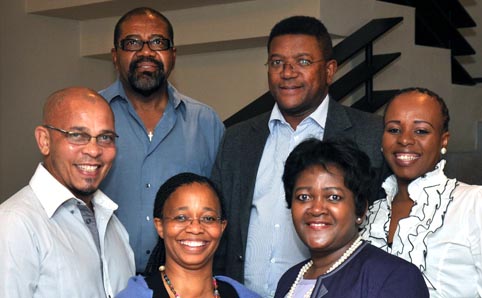Latest News Archive
Please select Category, Year, and then Month to display items
10 March 2022
|
Story Anthony Mthembu
|
Photo Unsplash
 The No Student Hungry team gearing up to start distributing food parcels to the selected students.
The No Student Hungry team gearing up to start distributing food parcels to the selected students.
The UFS is one of the many institutions of higher learning where food insecurity is an active issue. However, the
No Student Hungry Programme is one of the initiatives launched at the university to assist in fighting food insecurity at the institution.
The purpose of the programme
Since its inception in 2011, the initiative has assisted many students in acquiring a healthy meal. Additionally, the Food Environment Office also hands out food packages, so that students can continue to achieve academically. “We are trying to develop a healthy environment for students and make it easier for them to have a nice and healthy meal,” stated Annelize Visagie, who heads the Food Environment Office at the UFS. The Food Environment programme is spread out on all three campuses, each with its own facilitators. Furthermore, the programme mainly caters for students who are not funded by the National Student Financial Aid Scheme (NSFAS) but who are excelling academically. The abovementioned students apply for assistance online, and a list is then drawn up of students who receive assistance for the year.
Alternative solutions to keep the initiative running
On the Bloemfontein Campus, the No Student Hungry Programme will be catering for 200 students in the 2022 academic year, assisting them with a daily nutritious meal. Additional food parcels are also handed out to provide further assistance. “We give food parcels to the students on the list every Tuesday and Thursday at the Thakaneng Bridge,” Visagie highlighted. However, she argues that catering for the student population through this programme can be a challenge, as the demand for assistance is growing rapidly and the ability to assist is limited. The programme relies on partnerships and sponsors to assist the student body. In fact, the coordinators of the programme currently have a memorandum of understanding with Tiger Brands according to which they deliver around 100 food parcels for distribution.
In addition, the coordinators have put in place alternative measures to ensure that they can provide more food to students. “The
Kovsie Act Office, in partnership with the
Department of Sustainable Food Systems and Development, has started a food garden where healthy and nutritious produce are grown, in order to add value to the distribution,” she indicated. Although the programme can only assist to a point, students who are in desperate need of assistance are never turned away. In fact, the
Social Support Unit at Thakaneng Bridge usually assists students with food vouchers for a maximum of four days.
A commitment to teaching healthy eating habits
The programme is not only committed to curbing food insecurity, but also to ensuring that students have a healthy and balanced diet. As such, a booklet is being issued by the
Department of Nutrition and Dietetics in collaboration with the Department of Sustainable Food Systems and Development, which contains ways in which students can make a healthy meal using some of the ingredients offered in the food parcels.
“We want to teach students how to eat healthy in the cheapest way, because they don’t have a lot of money to buy expensive food products,” Visagie argued.
UFS hosts the nation's senior professionals in Student Affairs
2011-12-05
 |
|
Some of the Senior Student Affairs Professionals present at the meeting were back row from left: Dr Llewellyn MacMaster, Dean of Student Affairs: Stellenbosch University; Profs. Bobby Mandew, Dean of Student Affairs: University of Johannesburg; McGlory Speckman, Dean of Student Affairs: University of Pretoria; and Ms Babalwa Ntabeni-Matutu, Department of Higher Education and Training. Front from left are: Dr Choice Makhetha and Ms Khanyisile Nyembenzi, SAASSAP Project Officer from the University of KwaZulu-Natal.
Photo: Stephen Collett
|
The Deans of Students of thirteen of the country’s universities recently gathered at the University of the Free State's (UFS) Bloemfontein Campus to attend the Deans’ Forum of the South African Association of Senior Student Affairs Professionals (SAASSAP).
The heads of Students Affairs from universities such as Stellenbosch, Johannesburg and Pretoria discussed challenges facing higher education institutions and shared campus experiences during their meeting.
Dr Choice Makhetha, Acting Vice-Rector: External Relations at the UFS and President of SAASSAP, says the issues that were addressed included registrations and poverty on campuses. Dr Makhetha, who is serving a second term as president of the organisation, says they came up with strategies on how to support campuses in partnership with the Department of Higher Education and Training.
SAASSAP will host its 14th national conference next year from 24 - 26 October in Bloemfontein. The UFS and the Central University of Technology will host the conference together and it is expected that all twenty three member institutions as well as Student Affairs Associations from abroad will attend.